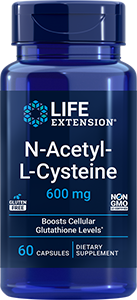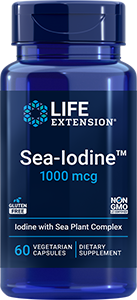
Newsletter
Newsletter
Large study found that individuals who took glucosamine had a lower risk of cancer mortality

In a study published November 2, 2022 in the journal Frontiers in Nutrition, men and women who used glucosamine had a lower risk of dying from cancer than those who did not use glucosamine.1
“Previous studies have shown anti-cancer and anti-inflammatory benefits of glucosamine,” authors Jian Zhou and colleagues noted. “Regular glucosamine [intake] was associated with lower lung cancer mortality in the UK Biobank cohort and this work was conducted to expand the evaluation to all cancers.”
During a median follow-up of 12.1 years, and in a fully adjusted model, glucosamine users had a five percent lower overall risk of cancer mortality compared with those who didn’t use glucosamine. The fully adjusted model found this five percent protection was present even after taking into account age, smoking status, obesity, physical activity, fruit and vegetable intake, and a range of other factors. Using this same model, the analysis also showed:
- A 32 percent lower risk of kidney cancer mortality
- A 16 percent lower risk of lung cancer mortality
- And a 24 percent lower risk of dying from cancer of the rectum
Additionally, among men who did not have diabetes or high cholesterol, intake of glucosamine was protective against prostate cancer mortality.
Preclinical research has suggested a number of different mechanisms that may account for glucosamine’s potential anticancer effects. These include anti-inflammatory and tumor-suppressive activity; modulation of various cell signaling pathways; inhibition of new blood vessel formation that would feed tumors; and promotion of anti-cancer immune responses.1
The study included 453,645 participants from the UK Biobank. Researchers analyzed data from men and women between the ages of 40 and 69, who were enrolled between 2006 and 2010, and then followed until early 2021. None of the individuals included in the current study had been diagnosed with cancer at the time of enrollment. Just over 19 percent of participants (88,224) in the study took glucosamine.
Products
Apply What You've Learned: Glucosamine
- Individuals with arthritis have long used glucosamine to help support joint health and comfort.2-4
- Glucosamine is often combined with chondroitin sulfate to target joint health. In a 6-month clinical trial, this combination had similar efficacy as the popular prescription therapy celecoxib (Celebrex).5
- People who use glucosamine have been found to have a lower risk of diabetes, chronic obstructive pulmonary disease and cardiovascular disease.6-8
- Studies have found a relationship between glucosamine with or without chondroitin and a lower mortality risk during various follow-up periods.9-11
References
- Zhou J et al. Front Nutr. 2022 Nov 2;9:947818.
- Matheson AJ et al. Drugs Aging. 2003;20(14):1041-60.
- Ogata T et al. Clin Rheumatol. 2018 Sep;37(9):2479-2487.
- Conrozier T et al. Front Pharmacol. 2022 Mar 17;13:820971.
- Hochburg MC et al. Ann Rheum Dis. 2016;75(1):37-44.
- Ma H et al. Diabetes Care. 2020 Apr;43(4):719-725.
- Zhang XR et al. Br J Nutr. 2021 Sep 16;1-12.
- Ma H et al. BMJ. 2019 May 14;365:l1628.
- King DE et al. J Am Board Fam Med. 2020 Nov-Dec;33(6):842-847.
- Li ZH et al. Ann Rheum Dis. 2020 Jun;79(6):829-836.
- Bell GA et al. Eur J Epidemiol. 2012 Aug;27(8):593-603.
Featured Life Extension Magazine® Article
Fight Aging by Boosting Autophagy
By Laurie Mathena
Autophagy is a process used by our cells to remove old and damaged components, thereby improving cell function. The autophagy process declines during aging, and this decline is associated with an elevated risk of chronic diseases. Increasing autophagy in animals has been associated with greater longevity.
In collaboration with the Insilico Medicine® research group, Life Extension® researchers identified luteolin (found in some vegetables and herbs) and piperlongumine (occurring in the long pepper plant) as autophagy-promoting nutrients. Luteolin and piperlongumine increase AMPK, which promotes autophagy, and decreases the activation of mTOR, a growth regulator that inhibits autophagy.
Read Full Article
What's Hot
Health Concern
Glucosamine plus chondroitin linked with lower risk of premature mortality
The November-December 2020 issue of the Journal of the American Board of Family Medicine published the finding of Dana E. King, MD, MS, and Jun Xiang, MS, MA, of an association between regular intake of glucosamine and chondroitin and a lower risk of dying during a median period of 107 months.

Cancer Adjuvant Therapy
Review integrative and novel therapies, including natural interventions and the off-label use of common drugs, which have potential value in the setting of adjuvant cancer care.
Related Life Extension Magazine® Articles

A 22% Lower Risk of Cardiovascular Death!
Regular glucosamine use was associated with a 22% lower risk of cardiovascular death.

Resurgence of Diabetes Complications
The increase in healthy longevity of Americans is deteriorating in people with less-than-optimal glucose control.
LE Live on Facebook
Explore live shows discussing the latest in health news with our very own Dr. Michael Smith and Dr. Crystal Gossard. Popular shows include Nutrients for Blood Pressure, The Best Nutrients for Your Hearing, Nutrients That Boost Male Sexual Health & ED, What’s Behind Your Brain Fog, Plant Extracts for Weight Management and more!
Learn More
Life Extension Magazine® Issue Now Online
A remarkable number of healthy-longevity findings have been published over the past 18 months.




